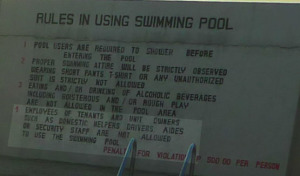An Unquestionable Sign
The first time I encountered a “No Maids Allowed” sign was back in 2012, at a condominium pool in Paranaque.
I had arrived there in the late afternoon. Though it was as hot and as humid as any other summer day in the Philippines, the only other people at the pool were a family – a father, a mother, their son, and their kasambahay.
The boy, who could not have been more than five, was moving at a slow but steady pace from one side of the pool to the other. Technically, he was swimming, but what he was doing was something far less graceful. He was clawing at the water with his arms and kicking at it with his feet, and by some forgiveness of physics, this flailing propelled him forward.
The kasambahay followed the boy around the perimeter of the pool, moving in parallel with each splash of his. Her uniform was noticeably unwet. As the boy neared the deep end, I started to wonder why the kasambahay wasn’t in the water with him. Were the boy to tire and have trouble in the pool, the kasambahay would be able react quicker if she were beside the small boy. I was no expert at lifeguarding, but surely that had to be safer.
The whole scene made no sense at all – Why doesn’t the kasambahay just hop into the pool? – until it made perfect sense. I did not eye it until the kasambahay rounded the corner and the sun glinted of it, but there on the far end hung a sign that explained everything:
No maids allowed.
As if it were a waste of words to explain further, there was a wide container drawn beneath the mandate, complete with the squiggly lines in it to indicate moving water. It looked like something a child might draw, only this was crafted in steel. It had taken time to design, make, and erect. This meant someone had put deep thought into the sign and somehow walked away with the conclusion that prohibiting maids from stepping into a pool was a thumbs-up, good thing.
I struggled to imagine what kind of reasoning led to its creation, especially in the enlightened year of 2012. Did the administration think that allowing kasambahays in the pool would affect the value of their properties? Did a homeowner think that allowing kasambahays in the pool would scare off their guests? Did a parent think that allowing kasambahays in the pool would give their child some sort of MAIDS-virus?
Whatever the case, everyone at the pool was following the sign, and our quiet complacency – mine included, given that I did not speak up or say anything – was what terrified me the most.
Like with so many things in the Philippines, we had simply chosen to accept things the way they were.
Voting With Your Dollar
More than three years have passed since that incident and signs like the “No maids allowed” do not appear to be going anywhere, anytime soon. In fact, there may even be more such signs, given that more and more condominiums rise into the Metro Manila skyline every day. Here’s just one example:

The prosperity of our real estate industry, however, should not encourage us to ignore the way in which some property developments suppress an entire class of our fellow Filipinos.
Such a statement may strike some as exaggerated, or dramatic even, but to them I would only ask that they pay closer attention to the facts. By virtue of doing a particular job, some Filipinos are barred from entering different rooms, facilities, and amenities at many condominiums.
In some cases, I’ll admit, these restrictions make sense, such as in the case of having a separate service elevator for workers carrying industrial equipment. But what is the sense in prohibiting them from using a certain bathroom? Such a stricture may not be particularly draconian, but discrimination is still discrimination, no matter how seemingly minor.
Realistically speaking, no revolution will be initiated on the behalf of these Filipinos anytime soon, and these signs will remain a fixture of condominium signage for the near future.
Change can come, but it will only come gradually and if we chose to vote with our dollar. So I will say this now in the hope that other prospective home buyers like me follow suit, or at least think about doing so: I will not buy a condominium from any developer that has such policies in place.
Like What you've read?
-
1GeorgeTolentino2
-
whatsinaname
-
Rizza Estoconing Sta Ana
-










